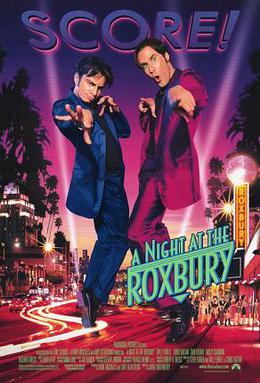
A Night at the Roxbury is a 1998 American comedy film based on a recurring sketch on television's long-running Saturday Night Live called "The Roxbury Guys". Saturday Night Live regulars Will Ferrell, Chris Kattan, Molly Shannon, Mark McKinney, and Colin Quinn star. This film expands on the original Saturday Night Live sketches where the Roxbury Guys were joined by that week's host, and bobbed their heads to Haddaway's hit song "What Is Love" while being comically rejected by women at various clubs.

We the Living is the debut novel of the Russian American novelist Ayn Rand. It is a story of life in post-revolutionary Russia and was Rand's first statement against communism. Rand observes in the foreword that We the Living was the closest she would ever come to writing an autobiography. Rand finished writing the novel in 1934, but it was rejected by several publishers before being released by Macmillan Publishing in 1936. It has since sold more than three million copies.

Alberto Díaz Gutiérrez, better known as Alberto Korda or simply Korda, was a Cuban photographer, remembered for his famous image Guerrillero Heroico of Argentine Marxist revolutionary Che Guevara.

Better Luck Tomorrow is a 2002 American independent crime drama film directed by Justin Lin. The film is about Asian American overachievers who become bored with their lives and enter a world of petty crime and material excess. Better Luck Tomorrow's cast include Parry Shen, Jason Tobin, Sung Kang, Roger Fan, and John Cho. The film tells a fictional story of youth violence, drawing inspiration from several sources, including the Columbine shootings and the murder of Stuart Tay, a teenager from Orange County, California.

Inessa Fyodorovna Armand was a French-Russian communist politician, member of the Bolsheviks and a feminist who spent most of her life in Russia. Armand, being an important figure in the pre-Revolution Russian communist movement and the early days of the communist era, had been almost forgotten for some time, until the partial opening of Soviet archives during the 1990s. Historian Michael Pearson wrote about her: "She was to help him (Lenin) recover his position and hone his Bolsheviks into a force that would acquire more power than the tsar, and would herself by 1919 become the most powerful woman in Moscow."
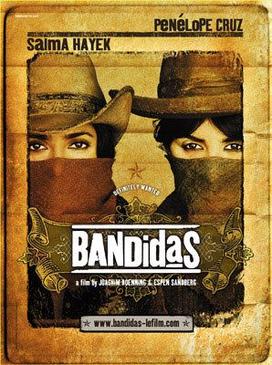
Bandidas is a 2006 Western action comedy film starring Salma Hayek and Penélope Cruz directed by Norwegian directors Joachim Rønning and Espen Sandberg and produced and written by Luc Besson. It tells the tale of two very different women in late-19th-century Mexico who become a bank robbing duo in an effort to combat a ruthless enforcer terrorizing their town.

Shakha Proshakha is a 1990 film directed by Satyajit Ray. It deals with four generations of a well-to-do Bengali family, with a focus on the third generation. This film displays an extraordinary use of Gregorian Chant and legendary orchestras of Bach and Beethoven.

Juraj Kukura is a Slovak actor.

Juraj Jakubisko was a Slovak film director. He directed fifteen feature films, between 1967 and 2008. He often took on the dual role of cinematographer, and is often also credited as a screenplay writer as he usually co-writes or writes the scripts of his movies. In 2000 he was named Best Slovak Director of the 20th century by film critics and journalists. His work is often described as magical realism.

The Way to Wealth or Father Abraham's Sermon is an essay written by Benjamin Franklin in 1758. It is a collection of adages and advice presented in Poor Richard's Almanack during its first 25 years of publication, organized into a speech given by "Father Abraham" to a group of people. Many of the phrases Father Abraham quotes continue to be familiar today. The essay's advice is based on the themes of work ethic and frugality.

My Sassy Girl is a 2008 romantic comedy film and the remake of the 2001 South Korean film of the same name. It stars Elisha Cuthbert and Jesse Bradford and was directed by Yann Samuell. Both films are based on a true story told in a series of blog posts written by Kim Ho-sik, who later adapted them into a novel. The film is set in New York City's Central Park and Upper East Side. Samuell, describes the film as "a fable about destiny, " while Bradford described it as "a romantic comedy about how they pull each other to a more healthy place by virtue of their relationship."
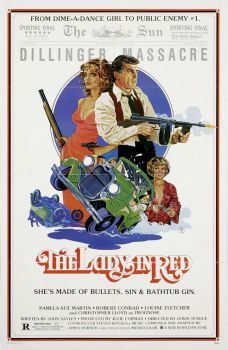
The Lady in Red is a 1979 American crime drama film directed by Lewis Teague and starring Pamela Sue Martin and Robert Conrad. It is an early writing effort of John Sayles who became better known as a director in the 1980s and 1990s.
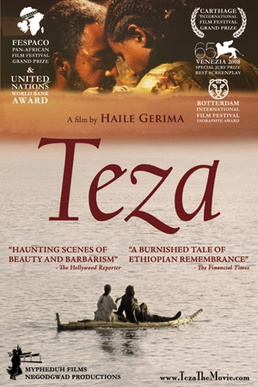
Teza is a 140 minutes 2008 Ethiopian drama film about the Derg period in Ethiopia. Teza won the top award at the 2009 Panafrican Film and Television Festival of Ouagadougou. The film was directed and written by Haile Gerima.
Dayo Gore is an African-American feminist scholar, former fellow of Harvard's Warren Center for North American History, formerly employed as assistant professor of history and of women's studies at the University of Massachusetts Amherst, Gore is currently an associate professor in the department of ethnic studies at University of California, San Diego. Gore is one of a new generation of young scholars active in preserving and exploring the infrequently chronicled history of 20th-century black women's radicalism, in the US and beyond. Along with Jeanne Theoharis and Komozi Woodard, Gore edited a collection of essays Want to Start A Revolution? Radical Women In The Black Freedom Struggle, to which she contributed the chapter "From Communist Politics to Black Power: The Visionary Politics and Transnational Solidarities of Victoria Ama Garvin".
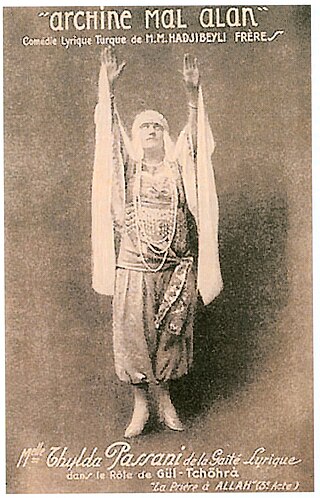
Arshin Mal Alan is a 1913 comic and romantic operetta by Azerbaijani composer Uzeyir Hajibeyov about a cloth peddler in 1900s Shusha, who is looking for a wife. Hajibeyov composed the operetta in Saint Petersburg and it was staged on October 25, 1913. The operetta is rich in national characteristics and realism. Following the opening in Azerbaijan, Arshin Mal Alan was performed in theatres of Tbilisi, Yerevan and Ashgabat, as well as Iran and Turkey.

The All-Union Leninist Young Communist League, usually known as Komsomol, was a political youth organization in the Soviet Union. It is sometimes described as the youth division of the Communist Party of the Soviet Union (CPSU), although it was officially independent and referred to as "the helper and the reserve of the CPSU".

The Baise Uprising was a short-lived uprising organized by the Chinese Communist Party (CCP) in northwestern Guangxi around the city of Baise. It officially began on December 11, 1929, and lasted until late 1931. The uprising established the Seventh Red Army and a soviet over a number of counties in the You River valley. It drew support from a pre-existing movement of Zhuang peasants led by Wei Baqun, and focused on land redistribution in the area it controlled. After a brief but costly attempt to capture Guangxi's major cities, the soviet was suppressed and surviving soldiers made their way to Jiangxi. Today, it is most famous for the role played by Deng Xiaoping, who was the CCP Central Committee's leading representative in Guangxi during the Uprising. Deng was strongly criticized, both during the Cultural Revolution and by modern historians, for the uprising's swift defeat and his decision to abandon the retreating Seventh Red Army.
In political contexts, cadre consists of persons with leadership skills within a political organization. In some socialist states, cadre is a group of people trained to carry out the goals of the Party-State and disseminate and enforce the official ideology. These groups are meant to stimulate loyalty and obedience to party rules and regulations by mobilizing citizens and encouraging collectivization. Cadres can be deployed in the field or employed in the office by the ruling party, the state, or the secret police. They are often created to break apart existing class hierarchies among citizens of the Party-State. Cadres were present in a number of communist countries that enforced collectivization, including the Soviet Union and Romania. Additionally, the People's Republic of China still maintains a cadre system to this day.
Cadres decide everything!

Talakjung vs Tulke is a 2014 Nepalese action drama film directed by Nischal Basnet and produced by Rabindra Singh Baniya. It was selected as the Nepalese entry for the Best Foreign Language Film at the 88th Academy Awards. The film is based on the 2003 Nepal's maoist revolution.

Maestra is a 2016 erotic thriller novel by L.S. Hilton, the penname of British author Lisa Hilton, and the first book in a trilogy consisting of Maestra (2016), Domina (2017) and Ultima (2018). The book was first published in the United Kingdom on 10 March 2016 through Zaffre Publishing and was released in the United States on 19 April of the same year, through G.P. Putnam's Sons, who also re-released Maestra in the UK.


















